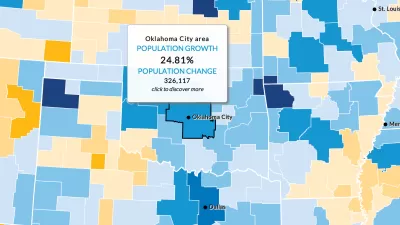Urban Institute

Transportation Equity Lessons from the Pandemic
Almost a year into the devastating effects of the COVID-19 pandemic, the Urban Institute assesses what we've learned about transportation equity—and what these lessons mean for the future.

Four Steps for Effective Land Use Reform
Land use and zoning reform is not a magic wand, and effective changes to any planning regime change requires careful work. A new report Urban Institute provides case studies and guidance on how to achieve desired outcomes from a reform process.

Landlords Facing Loss of Property and Income During Eviction Bans
Independent landlords struggle to keep up with the cost of rental units and continue to face massive income drops caused by eviction moratoriums. Some of them are pushing back.

Strengthening the Safety Net With Universal Housing Assistance
The Urban Institute simulated a model to predict the cost of a universal housing assistance program to support those who face homelessness.

Office-to-Residential Conversions Considered as Workers Go Remote
Reduced demand for office space after coronavirus could lead New York landlords to consider the conversion of offices to residential spaces.

Economic Independence or Auto Dependency?
A new study calls for "universal auto access" to combat poverty. It recommends subsidizing auto ownership or access for those who are economically unable to afford the high cost of owning, maintaining, and operating a personal motor vehicle.

Creative Placemaking's Role in Enhancing Community Safety
Efforts across the country show that these projects have the added benefit of improving community safety.

Addressing 'Reverse White Flight' in Chicago
A new report from the Urban Institute and the Metropolitan Planning Council looks at ways to fight perpetual segregation as Chicago's affluent white population booms.

Where the Economic Recovery Has Been Most Inclusive
Across racial and economic lines, not all cities are recovering equally.
Study Reveals Housing Discrimination Against Same-Sex Couples, Transgender Individuals
A study of three of the country's population and cultural centers reveals the kinds of discrimination same-sex couples and transgender individuals are likely to encounter on the rental market.
Urban Institute Report: Peak Homeownership Reached Nine Years Ago
Homeownership peaked at 67.3% in 2006. The Urban Institute forecasts its decline to the year 2030. Emily Badger of The Washington Post Wonkblog writes on the report released this month that evaluates homeownership rates among different demographics.

Mapping the Demographic Future of Cities
Cities change. The people living in cities change. A new online tool from the Urban Institute allows users to forecast demographic trends as far out at 2030.
Real Estate Boom and Bust Hit Minorities the Hardest
A new visualization tool by the Urban Institute provides a vivid portrait of an unfortunate truth: the foreclosure crisis and other effects of the Great Recession real estate market were worse for minority groups.
PILOT Agreements Gain in Popularity, As Non-Profits are Asked to Pay the Piper
The financial crises faced by many municipalities has them searching for ever more creative means to bolster city budgets. As a result, non-profit institutions are increasingly being asked to complete payments in lieu of taxes (PILOT) agreements.
Urban Design for Planners 1: Software Tools
This six-course series explores essential urban design concepts using open source software and equips planners with the tools they need to participate fully in the urban design process.
Planning for Universal Design
Learn the tools for implementing Universal Design in planning regulations.
Gallatin County Department of Planning & Community Development
Heyer Gruel & Associates PA
JM Goldson LLC
City of Camden Redevelopment Agency
City of Astoria
Transportation Research & Education Center (TREC) at Portland State University
Jefferson Parish Government
Camden Redevelopment Agency
City of Claremont


































